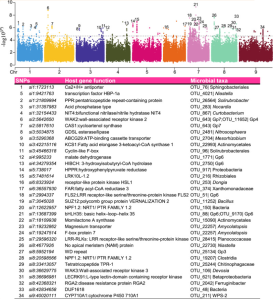A group from State Key Laboratory of Agricultural Genomics, BGI-Shenzhen, Shenzhen, China, etc. has reported about numerous potential genes associated with the root microbiota formation, which were identified by microbiome genome-wide association studies (mGWAS) based on 827 foxtail millet cultivars in a single environment.
https://www.ncbi.nlm.nih.gov/pmc/articles/PMC9546826/
A total of 644 taxonomically different bacterial strains from root microbiota of foxtail millet were collected, and 257 bacterial isolates were retained. From these isolates, representative cultivated strains of six positive marker OTUs and four negative marker OTUs with top beta estimation in the regression model were selected for the plant growth validation experiments.
where, Positive marker OTUs were (Acidovorax OTU_46, Bacillaceae OTU_22228, Kitasatospora OTU_8, Bacillus OTU_19414, Bacillus OTU_25704 and Bacillales OTU_381), and negative marker OTUs were (Shinella OTU_37, Bacillus OTU_54, Bacillaceae OTU_19835 and Bacillaceae OTU_28133).
These 10 biomarker strains were co-cultivated with foxtail millet Huagu12 (a bred cultivar of foxtail millet (Setaria italica) for 7-days in sterilized plates, and observed altered root lengths and plant heights compared with the control. The positive biomarker strains representing OTUs with top beta estimation showed significant growth-promoting abilities. Specifically, positive biomarker strain (Kitasatospora OTU_8) promoted both root and stem growth, whereas (Bacillus OTU_22228) and (Acidovorax OTU_46) only promoted shoot growth compared to the control. The negative marker strain (Bacillaceae OTU_19835) and (Bacillaceae OTU_28133) suppressed the shoot and root growth of Huagu12.
Through this study, it would be quite interesting to know that there are correlations between host genetic variation and microbiota abundance, indicating that microbiota changes with plant genotypes.

